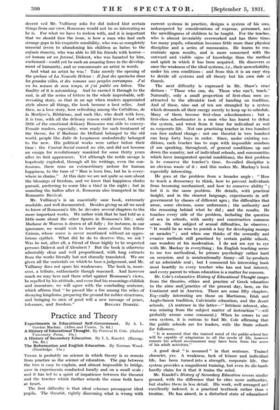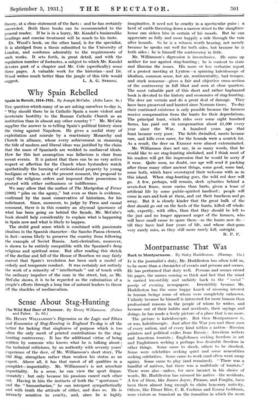Practice and Theory
Experiments in Educational Self-Government. By A. L. Gordon Mackay. (Allen and Unwin. 7s. 6d. ) The Reformation and English Education. By Norman Wood. (Routledge. 15s.)
THERE is probably no science in which theory is so remote from practice as the science of education. The gap between the two is easy to explain, and almost impossible to bridge, save in experiments conducted locally and on a small scale : and it has led to a spirit of impatience between the theorist and the teacher which further retards the cause both have at heart.
The first difficulty is that ideal schemes presuppose ideal pupils. The theorist, rightly discerning what is wrong with current systems in practice, designs a system of his own, unhampered by considerations of expense, personnel, and the unwillingness of children to be taught. For the teacher, who is almost invariably overworked and has three times too many pupils, education becomes little more than physical discipline and a series of mnemonics. He learns to con- centrate upon results, and is more concerned with the outward and visible signs of knowledge than the method and spirit in which it has been acquired. He discovers at once the weakness of the ideal systems, i.e., their nnworkability under his own conditions : and from this it is an easy step to deride all systems and all theory but his own rule of thumb.
The next difficulty is expressed in Mr. Shaw's cruel dictum : " Those who can, do. Those who can't, teach." Naturally, only a small proportion of first-class men are attracted to the altruistic task of handing on tradition. And of these, nine out of ten are strangled by a system which demands all their energy merely to keep up to schedule. Many of them become first-class schoolmasters ; but a first-class schoolmaster is a man who has learnt to defeat the system, and wrest from it time for individual as well as corporate life. Not one practising teacher in two hundred can face radical change : not one theorist in two hundred can keep forty boys in order. Since, under existing con- ditions, each teacher has to cope with impossible numbers (I am speaking, throughout, of general conditions up and down the country, not of individual schools, and communities which have inaugurated special conditions), the first problem is to conserve the teacher's time. So-called discipline is an obvious waste of it : and this makes Mr. Mackay's book especially interesting.
He goes at the problem from a broader angle : " How to teach a democracy to think, how to prevent individuals from becoming mechanized, and how to conserve ability " ; but it is the same problem. He details, with practical insight, and in the clearest language, experiments in self- government by classes of different ages ; the difficulties that arose, some obvious, some unforeseen ; the authority and the reasoning behind what he did ; and the results. He touches every side of the problem, including the question of sex in schools, with sanity and constructive common sense. On the subject of sexual difficulties, .he observes : " It would be as wise to punish a boy for developing mumps or measles " ; and when one thinks of the cowardly and evasive methods still practised by certain public schools, one wonders at his moderation. I do not see eye to eye with Mr. Mackay in everything ; his English teaching seems to me too methodical, he presses psychology rather hard on occasion, and is unintentionally funny—all by-products of an admirable zeal ; but I commend his interesting book most heartily to every teacher who has not lost interest, and every parent to whom education is a matter for concern.
Mr. Cole's exhaustive History of Educational Thought ranges from the theories, ethics and practice of Greek education to the aims and; practice of the present day, here, on the Continent and in America. There are some fifty chapters. Esp'cially interesting are those on Martianus, Irish and Anglo-Saxon tradition, Calvinistic education, and the Jesuit schools. (A sentence in the latter—" Intrinsic interest, alas, was missing from the subject matter of instruction "—will probably arouse some comment.) When he comes to our own system, it is curious to find Mr. Cole affirming that the public schools are for leaders, with the State schools for followers.
" It is assumed that the trained mind of the public-school boy will be capable of adaptation to all the needs of life, however remote his school environment may have been from the scene of his adult activities."
A good deal " is assumed " in that sentence. Trained character, yes. A weakness, lack of leisure and individual life, has been turned into a strength, corporate life. Our system provides a magnificent training, but even its die-hards hardly claim for it that it trains the mind.
Mr. Randers History of Secondary Education covers similar ground, with the difference that he cites more authorities, but studies them in less detail. His work, well arranged and excellently indexed, is a practical textbook rather than a treatise. He has aimed, in a disturbed state of educational theory, at a clear statement of the facts : and he has certainly succeeded. Both these books can be recommended to the general reader. If he is in a hurry, Mr. Kandel's businesslike headings and concise treatment will be much to his taste.
Dr. Wood's book, on the other hand, is for the specialist. It is abridged from a thesis submitted to the University of London, and conforms admirably to the requirements of such works. It sets forth, in great detail, and with the regulation number of footnotes, a subject to which Mr. Kandel devotes part of a chapter and Mr. Cole (specifically) some three pages. A valuable work for the historian—and Dr. Wood writes much better than the jangle of this title would































 Previous page
Previous page